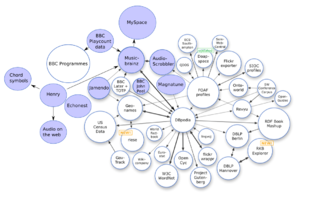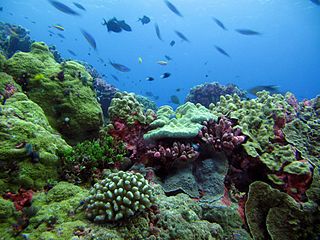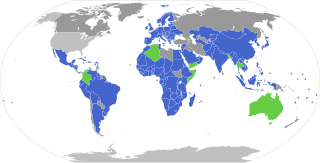External links
- Joint Statement to the Parties on Biological Diversity Open Access to Biodiversity Data and Information
- Conservation Commons
The Conservation Commons is the expression of a cooperative effort of non-governmental organizations, international and multi-lateral organizations, governments, academia, and the private sector, to improve open access to and unrestricted use of, data, information and knowledge related to the conservation of biodiversity, with the belief that this will contribute to improving conservation outcomes. At its simplest, it encourages organizations and individuals alike to ensure open access to data, information, expertise and knowledge related to the conservation of biodiversity. The goal of the Conservation Commons is to promote conscious, effective, and equitable sharing of knowledge resources to advance conservation.

The International Union for Conservation of Nature is an international organization working in the field of nature conservation and sustainable use of natural resources. It is involved in data gathering and analysis, research, field projects, advocacy, and education. IUCN's mission is to "influence, encourage and assist societies throughout the world to conserve nature and to ensure that any use of natural resources is equitable and ecologically sustainable".
The International Treaty on Plant Genetic Resources for Food and Agriculture, is a comprehensive international agreement in harmony with the Convention on Biological Diversity, which aims at guaranteeing food security through the conservation, exchange and sustainable use of the world's plant genetic resources for food and agriculture (PGRFA), the fair and equitable benefit sharing arising from its use, as well as the recognition of farmers' rights. It was signed in 2001 in Madrid, and entered into force on 29 June 2004.

Environmental protection is the practice of protecting the natural environment by individuals, organizations and governments. Its objectives are to conserve natural resources and the existing natural environment and, where possible, to repair damage and reverse trends.
The Intergovernmental Oceanographic Commission of UNESCO (IOC/UNESCO) was established by resolution 2.31 adopted by the General Conference of UNESCO. It first met in Paris at Unesco Headquarters from 19 to 27 October 1961. Initially, 40 States became members of the commission. The IOC assists governments to address their individual and collective ocean and coastal management needs, through the sharing of knowledge, information and technology as well as through the co-ordination of programs and building capacity in ocean and coastal research, observations and services.

The Global Biodiversity Information Facility (GBIF) is an international organisation that focuses on making scientific data on biodiversity available via the Internet using web services. The data are provided by many institutions from around the world; GBIF's information architecture makes these data accessible and searchable through a single portal. Data available through the GBIF portal are primarily distribution data on plants, animals, fungi, and microbes for the world, and scientific names data.
Traditional knowledge (TK), indigenous knowledge (IK) and local knowledge generally refer to knowledge systems embedded in the cultural traditions of regional, indigenous, or local communities. According to the World Intellectual Property Organization (WIPO) and the United Nations (UN), traditional knowledge and traditional cultural expressions (TCE) are both types of indigenous knowledge.

Sustainable forest management (SFM) is the management of forests according to the principles of sustainable development. Sustainable forest management has to keep the balance between three main pillars: ecological, economic and socio-cultural. Sustainable forestry can seem contradicting to some individuals as the act of logging trees is not sustainable. However, the goal of sustainable forestry is to allow for a balance to be found between ethical forestry and maintaining biodiversity through the means of maintaining natural patterns of disturbance and regeneration. Successfully achieving sustainable forest management will provide integrated benefits to all, ranging from safeguarding local livelihoods to protecting biodiversity and ecosystems provided by forests, reducing rural poverty and mitigating some of the effects of climate change. Forest conservation is essential to stop climate change.

Open data is data that is openly accessible, exploitable, editable and shared by anyone for any purpose. Open data is licensed under an open license.

Open knowledge is knowledge that is free to use, reuse, and redistribute without legal, social, or technological restriction. Open knowledge organizations and activists have proposed principles and methodologies related to the production and distribution of knowledge in an open manner.

Deforestation in Cambodia has increased in recent years. Cambodia is one of the world's most forest endowed countries, that was not historically widely deforested. However, massive deforestation for economic development threatens its forests and ecosystems. As of 2015, the country has one of the highest rates of deforestation in the world.
The Conservation Geoportal was an online geoportal, intended to provide a comprehensive listing of geographic information systems (GIS) datasets and web map service relevant to biodiversity conservation. It is currently defunct. The site, its contents and functionality were free for anyone to use and contribute to. The Conservation Geoportal was launched on June 28, 2006 at the joint Society for Conservation Biology and Society for Conservation GIS Conference in San Jose, California, USA. As of October 2007, it included metadata for over 3,667 GIS records.

The Instituto Nacional de Biodiversidad (INBio) is the national institute for biodiversity and conservation in Costa Rica. Created at the end of the 1980s, and despite having national status, it is a privately run institution that works closely with various government agencies, universities, business sector and other public and private entities inside and outside of the country. The goals of the institute are to complete an inventory of the natural heritage of Costa Rica, promote conservation and identify chemical compounds and genetic material present in living organisms that could be used by industries such as pharmaceuticals, cosmetics or others.

The World Database on Protected Areas (WDPA) is the largest assembly of data on the world's terrestrial and marine protected areas, containing more than 260,000 protected areas as of August 2020, with records covering 245 countries and territories throughout the world. The WDPA is a joint venture between the United Nations Environment Programme World Conservation Monitoring Centre and the International Union for Conservation of Nature World Commission on Protected Areas.
A sustainability organization is (1) an organized group of people that aims to advance sustainability and/or (2) those actions of organizing something sustainably. Unlike many business organizations, sustainability organizations are not limited to implementing sustainability strategies which provide them with economic and cultural benefits attained through environmental responsibility. For sustainability organizations, sustainability can also be an end in itself without further justifications.

The Nagoya Protocol on Access to Genetic Resources and the Fair and Equitable Sharing of Benefits Arising from their Utilization to the Convention on Biological Diversity, also known as the Nagoya Protocol on Access and Benefit Sharing (ABS) is a 2010 supplementary agreement to the 1992 Convention on Biological Diversity (CBD). Its aim is the implementation of one of the three objectives of the CBD: the fair and equitable sharing of benefits arising out of the utilization of genetic resources, thereby contributing to the conservation and sustainable use of biodiversity. It sets out obligations for its contracting parties to take measures in relation to access to genetic resources, benefit-sharing and compliance.
Soil governance refers to the policies, strategies, and the processes of decision-making employed by nation states and local governments regarding the use of soil. Globally, governance of the soil has been limited to an agricultural perspective due to increased food insecurity from the most populated regions on earth. The Global Soil Partnership, GSP, was initiated by the Food and Agriculture Organization (FAO) and its members with the hope to improve governance of the limited soil resources of the planet in order to guarantee healthy and productive soils for a food-secure world, as well as support other essential ecosystem services.
The digital commons are a form of commons involving the distribution and communal ownership of informational resources and technology. Resources are typically designed to be used by the community by which they are created.
The Papua New Guinea Greens Party or PNG Greens are a minor political party in Papua New Guinea. Founded in 2001, the party took part in the 2002, 2007, 2012 and 2017 general elections, without winning a seat. They are a member of the Global Greens and of the Asia Pacific Greens Federation.
The South African National Biodiversity Institute (SANBI) is an organisation established in 2004 in terms of the National Environmental Management: Biodiversity Act, No 10 of 2004, under the South African Department of Environmental Affairs, tasked with research and dissemination of information on biodiversity, and legally mandated to contribute to the management of the country’s biodiversity resources.